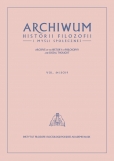Od imago do suity – zmiana paradygmatu filozoficznego w myśli antycznej Grecji
From Imago to Suite – a Change of Philosophical
Paradigm in Ancient Greek Thought
Author(s): Małgorzata KwietniewskaSubject(s): History of Philosophy, Philosophical Traditions
Published by: Instytut Filozofii i Socjologii Polskiej Akademii Nauk
Keywords: Orphism;Hen panta (all is one);India;Presocratics;ontical paradigm;Aristotle;
Summary/Abstract: In this article, I pay attention to a sentence by Mousaios, which appears in the Orphic literature. It is the main motif of the cosmogenic myths, whose content is surprisingly close to that of Old Indian literature, for example in the Vedic notion of Tad Ekam. In the Orphic mythology a theoretical aspect of the one-multiple relationship is embodied by Zeus, while a practical one by his son Zagreus. This uncoincidental coincidence can be proven by means of analysing the formal structure of the respective sentences which appear in the above mentioned literature: they always consist of two coordinating parts, with the present tense, linked by the “and” conjunction. Analogical sentences can be found in the Presocratics, the only difference being that the latter try to determine the meaning of the one as water, air, fire, etc. This fact is noted by Aristotle. Therefore, the author of Metaphysics corrects the Presocratics by adding to their sentences certain prepositions of time. This is by no means a stylistic device. The reason lies in the fact that the Presocratic vision of the world referred to a paradigm which could be called imago. Aristotle, however, used a paradigm which could be compared to a musical work, e.g. a suite, all parts of which are consecutive. This cognitive paradigm promotes discursive thinking devoid of contradictions. Certain contemporary philosophers, who are called “the philosophers of difference”, claim that this is the case, and purposely return to the world of imago.
Journal: Archiwum Historii Filozofii i Myśli Społecznej
- Issue Year: 64/2019
- Issue No: 64
- Page Range: 57-79
- Page Count: 23
- Language: Polish

